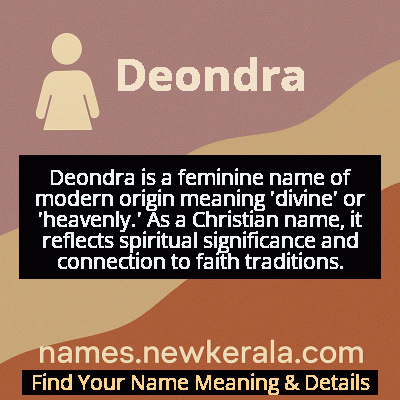Deondra Name Meaning & Details
Origin, Popularity, Numerology Analysis & Name Meaning of Deondra
Discover the origin, meaning, and cultural significance of the name DEONDRA. Delve into its historical roots and explore the lasting impact it has had on communities and traditions.
Name
Deondra
Gender
Female
Origin
Christian
Lucky Number
7
Meaning of the Name - Deondra
Deondra is a feminine name of modern origin meaning 'divine' or 'heavenly.' As a Christian name, it reflects spiritual significance and connection to faith traditions.
Deondra - Complete Numerology Analysis
Your Numerology Number
Based on Pythagorean Numerology System
Ruling Planet
Neptune (Ketu)
Positive Nature
Intuitive, analytical, spiritual, and inquisitive.
Negative Traits
Secretive, reserved, aloof, and can be overly critical.
Lucky Colours
Green, yellow.
Lucky Days
Monday.
Lucky Stones
Cat’s eye, moonstone.
Harmony Numbers
1, 5, 6.
Best Suited Professions
Scientists, researchers, spiritual leaders, detectives.
What People Like About You
Depth of knowledge, analytical skills, spirituality.
Famous People Named Deondra
Deondra Brown
Musician
Member of The 5 Browns piano ensemble, Juilliard-trained classical pianist
Deondra Dixon
Actress
Known for roles in independent films and television series
Deondra Parks
Educator
Award-winning teacher and literacy advocate in urban education
Name Variations & International Equivalents
Click on blue names to explore their detailed meanings. Gray names with will be available soon.
Cultural & Historical Significance
The name's cultural journey mirrors larger social movements toward self-definition and cultural pride, serving as an example of how naming practices can express both individual creativity and collective identity. Within Christian communities, Deondra represents the continuation of biblical naming traditions through modern linguistic innovation, demonstrating how faith-based naming evolves while maintaining core spiritual values. The name's usage patterns reflect the importance of both uniqueness and meaning in contemporary Christian naming practices, particularly among families seeking to honor their faith while expressing cultural distinctiveness.
Extended Personality Analysis
Women named Deondra are typically characterized by a blend of strength and compassion that reflects their name's divine origins. They often possess natural leadership abilities combined with deep emotional intelligence, making them effective in both professional and personal relationships. Their intuitive nature and strong moral compass frequently guide them toward helping professions or creative pursuits where they can make a positive impact on others' lives. Deondras are known for their resilience and ability to maintain grace under pressure, qualities that others often find inspiring and comforting.
In social settings, Deondras tend to be warm and engaging, with a genuine interest in understanding different perspectives. They often serve as peacemakers or mediators in conflicts, using their diplomatic skills to find common ground. Their spiritual connection, suggested by their name's meaning, frequently manifests as a deep sense of purpose and inner peace that others are drawn to. While strong-willed and determined when pursuing goals, they typically balance this drive with empathy and consideration for others, creating relationships built on mutual respect and trust. This combination of strength and sensitivity makes Deondras particularly effective in roles that require both conviction and compassion.
Modern Usage & Popularity
In contemporary naming practices, Deondra maintains a steady but modest presence, primarily within African American communities and Christian families who appreciate its spiritual significance and distinctive sound. The name reached its peak popularity during the 1990s and has since settled into consistent but infrequent usage, appearing occasionally in birth records across the United States. Modern parents who choose Deondra often seek names that balance uniqueness with meaningful roots, valuing its connection to divine concepts while appreciating its modern feminine appeal. Current usage trends show the name being selected by parents who want to honor Christian traditions while giving their daughters a name that stands out without being overly unconventional. The name's stability in usage suggests it has found a comfortable niche rather than following dramatic popularity swings.
Symbolic & Spiritual Meanings
Symbolically, Deondra represents the embodiment of divine qualities in human form, serving as a reminder of the sacred potential within every individual. The name carries metaphorical meanings of spiritual guidance, inner light, and moral integrity, suggesting a person who brings heavenly qualities into earthly existence. It symbolizes the journey of faith made manifest through character and action, representing the idea that true strength comes from spiritual grounding rather than mere physical or social power. The name also carries connotations of protection and nurturing, reflecting the traditional association of divine feminine energy with creation, compassion, and wisdom. In broader symbolic interpretation, Deondra represents the harmonious balance between strength and grace, authority and empathy, making it a powerful symbolic representation of integrated feminine power.

